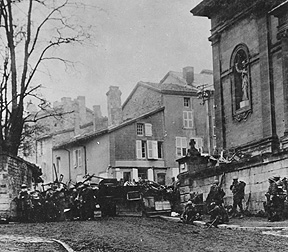Some helpful reminders from the U.S. Department of Veterans Affairs:

World War I – known at the time as “The Great War” – officially ended when the Treaty of Versailles was signed on June 28, 1919, in the Palace of Versailles outside the town of Versailles, France. However, fighting ceased seven months earlier when an armistice, or temporary cessation of hostilities, between the Allied nations and Germany went into effect on the eleventh hour of the eleventh day of the eleventh month. For that reason, November 11, 1918, is generally regarded as the end of “the war to end all wars.”
. . . In November 1919, President Wilson proclaimed November 11 as the first commemoration of Armistice Day with the following words: “To us in America, the reflections of Armistice Day will be filled with solemn pride in the heroism of those who died in the country’s service and with gratitude for the victory, both because of the thing from which it has freed us and because of the opportunity it has given America to show her sympathy with peace and justice in the councils of the nations…”
. . . The Uniform Holiday Bill (Public Law 90-363 (82 Stat. 250)) was signed on June 28, 1968, and was intended to ensure three-day weekends for Federal employees by celebrating four national holidays on Mondays: Washington’s Birthday, Memorial Day, Veterans Day, and Columbus Day. It was thought that these extended weekends would encourage travel, recreational and cultural activities and stimulate greater industrial and commercial production. Many states did not agree with this decision and continued to celebrate the holidays on their original dates.
The first Veterans Day under the new law was observed with much confusion on October 25, 1971. It was quite apparent that the commemoration of this day was a matter of historic and patriotic significance to a great number of our citizens, and so on September 20th, 1975, President Gerald R. Ford signed Public Law 94-97 (89 Stat. 479), which returned the annual observance of Veterans Day to its original date of November 11, beginning in 1978. This action supported the desires of the overwhelming majority of state legislatures, all major veterans service organizations and the American people.
Veterans Day continues to be observed on November 11, regardless of what day of the week on which it falls. The restoration of the observance of Veterans Day to November 11 not only preserves the historical significance of the date, but helps focus attention on the important purpose of Veterans Day: A celebration to honor America’s veterans for their patriotism, love of country, and willingness to serve and sacrifice for the common good.
[Photo shows soldiers of the 353rd Infantry near a church at Stenay, Meuse in France, as they waited for news about the end of hostilities. This photo was taken at 10:58 a.m., on November 11, 1918, two minutes before the Armistice went into effect.]






/cdn0.vox-cdn.com/uploads/chorus_asset/file/4082852/Figure_6a_.0.png) to say that living in a democracy is “essential.” Americans overall (but particularly those who are among the top 15% of income earners) are increasingly likely to agree that Americans would be better off with “a strong leader” instead of “elections.” Americans, and democratic citizens throughout the world, have become more likely than in the past to say that “army rule” would be a good way to run the country. Clearly, education about the advantages of democracy, and the abundant disadvantages of nondemocratic alternatives, needs to become a top priority of civic educators.
to say that living in a democracy is “essential.” Americans overall (but particularly those who are among the top 15% of income earners) are increasingly likely to agree that Americans would be better off with “a strong leader” instead of “elections.” Americans, and democratic citizens throughout the world, have become more likely than in the past to say that “army rule” would be a good way to run the country. Clearly, education about the advantages of democracy, and the abundant disadvantages of nondemocratic alternatives, needs to become a top priority of civic educators.